Last updated: September 5, 2021
Article
Preludes to the Trail of Tears
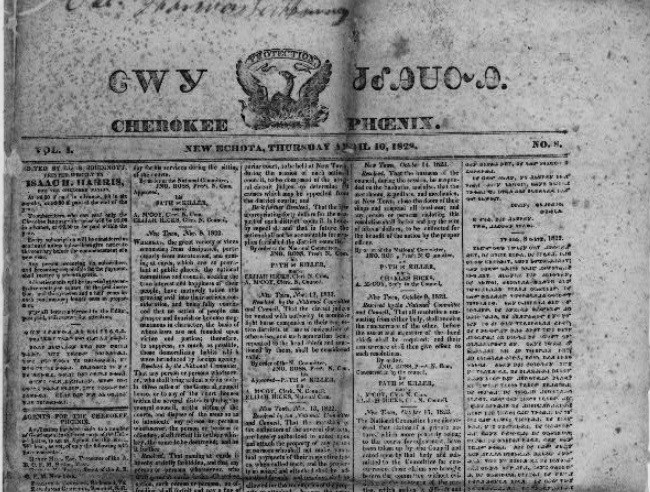
Cherokee Phoenix, New Echota, Georgia. Photograph. Retrieved from the Library of Congress, <www.loc.gov/item/97512373/>.
The Great Intrusion
In 1828, European-Americans discovered gold in the Appalacian Mountains of Georgia. This land was part of the Cherokee Nation. Members of the Nation first discovered this gold in the early 1700s and it remained virtually untouched for 100 years.
One of the supposed first finders of this gold, Benjamin Parks, recalls the scene of thousands of miners flocking to Georgia to seek personal fortune. [Atlanta Constitution, July 15, 1894]
"The news got abroad, and such excitement you never saw. It seemed within a few days as if the whole world must have heard of it, for men came from every state I had ever heard of. They came afoot, on horseback and in wagons, acting more like crazy men than anything else. All the way from where Dahlonega now stands to Nuckollsville [Auraria] there were men panning out of the branches and making holes in the hillsides."
The Cherokee phoenix and Indian's advocate was a weekly publication created and printed by the Cherokee Nation from 1828 - 1834. An author in this newspaper reported:
"Our neighbors who regard no law and pay no respects to the laws of humanity are now reaping a plentiful harvest. . . . We are an abused people."
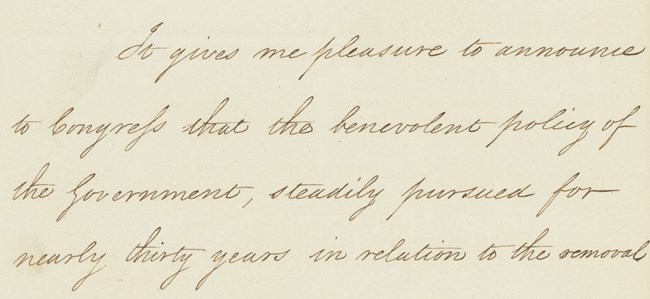
National Archives: Records of Rights
Indian Removal Act, 1830
On May 28, 1830, the Indian Removal Act was signed by President Andrew Jackson. The Senate had passed it by a vote of 28 - 19 and the House of Representatives passed it by a vote of 101 - 97. This law did not immediately remove American Indians from their lands, however it gave the president the opportunity to negotiate treaties to do so.
In his Second Annual Message to Congress, President Jackson reports: [Library of Congress]
"It gives me pleasure to announce to Congress that the benevolent policy of the Government, steadily pursued for nearly thirty years, in relation to the removal of the Indians beyond the white settlements is approaching to a happy consummation. Two important tribes have accepted the provision made for their removal at the last session of Congress, and it is believed that their example will induce the remaining tribes also to seek the same obvious advantages...
...The present policy of the Government is but a continuation of the same progressive change by a milder process. The tribes which occupied the countries now constituting the Eastern States were annihilated or have melted away to make room for the whites. The waves of population and civilization are rolling to the westward, and we now propose to acquire the countries occupied by the red men of the South and West by a fair exchange, and, at the expense of the United States, to send them to land where their existence may be prolonged and perhaps made perpetual...
...Rightly considered, the policy of the General Government toward the red man is not only liberal, but generous. He is unwilling to submit to the laws of the States and mingle with their population. To save him from this alternative, or perhaps utter annihilation, the General Government kindly offers him a new home, and proposes to pay the whole expense of his removal and settlement."
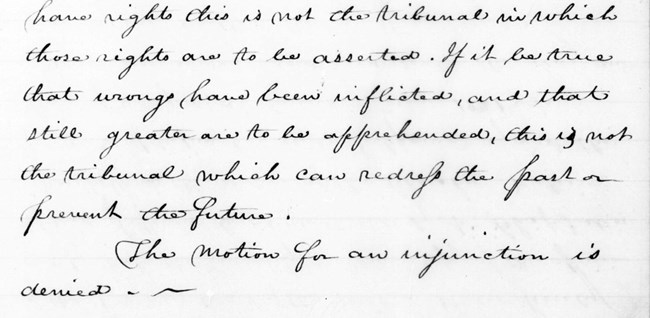
Library of Congress
Cherokee Nation v. Georgia, 1831
The Cherokee Nation continually refused to sign treaties to remove them from their land. At the same time, miners continued to push into northern Georgia. The state began revoking the rights of the Cherokee Nation, thus prompting members to seek a federal injunction. It was denied based on its merits due to the Nation being a dependent of the United States and there was no original jurisdition.
In the second of "The Marshall Trilogy," Chief Justice John Marshall decides:
"If courts were permitted to indulge their sympathies, a case better calculated to excite them can scarcely be imagined. A people once numerous, powerful, and truly independent, found by our ancestors in the quiet and uncontrolled possession of an ample domain, gradually sinking beneath our superior policy, our arts, and our arms, have yielded their lands by successive treaties, each of which contains a solemn guarantee of the residue, until they retain no more of their formerly extensive territory than is deemed necessary to their comfortable subsistence. To preserve this remnant the present application is made. Before we can look into the merits of the case, a preliminary inquiry presents itself. Has this Court jurisdiction of the cause?...
...This argument is imposing, but we must examine it more closely before we yield to it. The condition of the Indians in relation to the United States is perhaps unlike that of any other two people in existence. In the general, nations not owing a common allegiance are foreign to each other. The term foreign nation is, with strict propriety, applicable by either to the other. But the relation of the Indians to the United States is marked by peculiar and cardinal distinctions which exist nowhere else....
...If it be true that the Cherokee Nation have rights, this is not the tribunal in which those rights are to be asserted. If it be true that wrongs have been inflicted and that still greater are to be apprehended, this is not the tribunal which can redress the past or prevent the future. The motion for an injunction is denied."
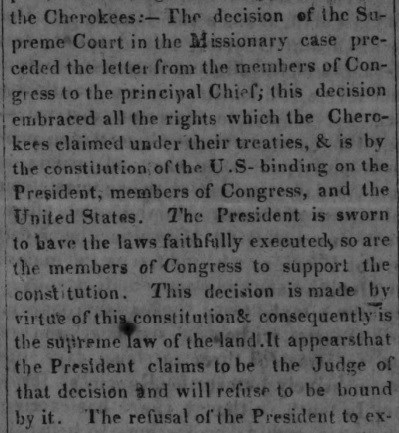
Library of Congress: Chronicling America.
Worcester v. Georgia, 1832
Samuel Worcester was charged and sentenced in Georgia for living on the land owned by the Cherokee Nation without a permit. Members of the Cherokee Nation had invited Mr. Worcester, a Christian minister, to preach the gospel in their attempts to further assimilate with European-American culture. The Cherokee Nation once again found themselves at the U.S. Supreme Court. This time the court ruled that The Nation was an independent, sovereign nation that was not subject to state laws. Therefore, Samuel Worcester is not guilty as he acted with the Cherokee Nation, a sovereign entity, on their land.
In the third case of the "Marshall Trilogy," Chief Justice Marshall decides:
...The Cherokee Nation, then, is a distinct community occupying its own territory, with boundaries accurately described, in which the laws of Georgia can have no force, and which the citizens of Georgia have no right to enter but with the assent of the Cherokees themselves, or in conformity with treaties and with the acts of Congress. The whole intercourse between the United States and this nation, is, by our Constitution and laws, vested in the government of the United States....
...It is the opinion of this Court that the judgment of the Superior Court for the County of Gwinnett, in the state of Georgia, condemning Samuel A. Worcester to hard labor in the penitentiary of the state of Georgia for four years was pronounced by that court under color of a law which is void, as being repugnant to the Constitution, treaties, and laws of the United States, and ought, therefore, to be reversed and annulled."
Despite this ruling, President Jackson threw his support to Georgia in ignoring the Supreme Court. In response, the Cherokee phoenix and Indian advocate reported:
...The refusal of the President to execute this decision is under the consitution an impeachable offence, these members then, as men of integrity and virtue are bound at the next Congress to know the cause of the non-execution of this decision. If the President continues to refuse to be bound by it, the alternative of impeachment is presented, and what a spectacle will this be to the world!"
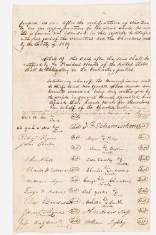
National Archives Catalog
The Treaty of New Echota, 1835
A group of 19 Cherokee men signed a treaty with the U.S. Government as afforded by the Indian Removal Act of 1830. Among the Cherokee men were Major Ridge, George W. Adair, and Andrew Ross. These men and approximately 500 Cherokee met with U.S. representatives to negotiate 5 million dollars and land in present-day Oklahoma in exhange for 7 million acres of ancestral land. While they believed this way the only way to save their people, this group of Cherokee did not have authority to sign a treaty. Despite arguments from Cherokee Chief John Ross, the treaty was ratified in March, 1836.
"The Cherokee nation hereby cede relinquish and convey to the United States all the lands owned claimed or possessed by them east of the Mississippi river, and hereby release all their claims upon the United States for spoliations of every kind for and in consideration of the sum of five millions of dollars to be expended paid and invested in the manner stipulated and agreed upon in the following articles But as a question has arisen between the commissioners and the Cherokees whether the Senate in their resolution by which they advised “that a sum not exceeding five millions of dollars be paid to the Cherokee Indians for all their lands and possessions east of the Mississippi river” have included and made any allowance or consideration for claims for spoliations it is therefore agreed on the part of the United States that this question shall be again submitted to the Senate for their consideration and decision and if no allowance was made for spoliations that then an additional sum of three hundred thousand dollars be allowed for the same..."
An Extension
The 8th President of the United States, Martin Van Buren, was aware of the contension of the treaty between members of the Cherokee Nation. He provided a two year extension on the treaty to allow time for the members to move to their new home in present-day Oklahoma. Then, in May of 1838, he ordered General Winfield Scott to evict the remaining Cherokees east of the Mississippi. The Trail of Tears had begun.
President Van Buren told Congress in his first annual message, December 5, 1837:
"...The decrease in numbers of the tribes within the limits of the States and Territories has been most rapid. If they be removed, they can be protected from those associations and evil practices which exert so pernicious and destructive an influence over their destinies. They can be induced to labor and to acquire property, and its acquisition will inspire them with a feeling of independence. Their minds can be cultivated, and they can be taught the value of salutary and uniform laws and be made sensible of the blessings of free government and capable of enjoying its advantages..."
